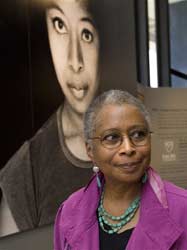An evening with Alice Walker
By Meera Ashar | 15 May 2009
Meeting poets I am disconcerted sometimes
by the colour of their socks
the suspicion of a wig
the wasp in the voice
and an air, sometimes, of dankness.
Best to meet in poems:
cool speckled shells
in which one hears
a sad but distant sea.
--- Eunice de Souza Last week I had the chance to listen to Pulitzer Prize-winning author, Alice Walker. Having studied and taught her work for more than a decade I was thrilled at the thought of hearing Alice Walker speak in Atlanta, the city from where she graduated, a city close to her hometown, Eatonton.
Last week I had the chance to listen to Pulitzer Prize-winning author, Alice Walker. Having studied and taught her work for more than a decade I was thrilled at the thought of hearing Alice Walker speak in Atlanta, the city from where she graduated, a city close to her hometown, Eatonton.
Though I grew up in a place that was very different from the world of Alice Walker, I had always been inspired by the simple and powerful assertion of human dignity that embodied all her work.
Though Walker has written in several genres and on a wide range of topics, she is best known for her ‘womanist’ novels about the strengths and struggles of black women in a racist, sexist and godless society. She coined the term ‘womanist’ to talk about the experiences of ‘women of colour’ in her book In Search of Our Mother’s Garden: Womanist Prose. The work for which she won the Pulitzer Prize in 1983, and for which she is best known, however, is The Colour Purple. Written after two world wars and two feminist movements, Walker’s book displays deep sensitivity to issues of poverty, human dignity, exploitation, and suffering. Her unique appeal lies in the fact that she recognizes that the perpetrators of sexism and injustice are often also victims of another kind. Thus she speaks of a more holistic empowerment and not just a ‘fighting back’ against certain people or groups of people.
The Color Purple does not follow the traditional narrative structure but is rather in the form of a series of undated letters. The letters are in ‘black folk language’, which does not facilitate quick reading, but does succeed in transporting the reader into the world of Celie, a young black girl living in Georgia in the early twentieth century
Celies letters are initially written to God, and later to her sister and closest friend Nettie. The letters evolve in language, tone and maturity as Celie grows older and struggles through her despotic marriage. For a long time, Celie is just scared of her husband; until her husband's mistress comes to live with them to recover from a serious illness.
Celie nurses her and eventually they become friends. Celie is inspired and encouraged by Shug. Celie's daughter in law, Sofia also urges Celie to stand up for herself and fight prejudice and injustice. In their own struggles against patriarchy and slavery the strong bonds of sisterhood between these women help them understand each other and themselves better.
It is perhaps in the same spirit that Walker referred to President Obama as ‘Brother Obama’ in an open letter she wrote recently. And listening to her speak passionately and full of hope for the future, I was drawn back into the world of Celie, but while Celie’s world was multilayered with several shades of complex emotional and social relationships, Walker’s hope and optimism sounded a little naïve and innocent, though moving. Walker has woven an incredibly intense world in The Color Purple, and perhaps a prosaic understanding of that world, its suffering, its joys and its hopes is just not possible!


















